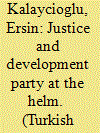| Srl | Item |
| 1 |
ID:
081935


|
|
|
|
|
| Publication |
2008.
|
| Summary/Abstract |
The Turkish party system experienced a serious blow in the early 1980s, when the military government in power closed down all the former legal political parties. Therefore, little evidence of strong psychological ties between voters and the political parties they supported at the polls is expected. This essay draws upon existing literature on voting behavior to develop four hypotheses to explain partisan affiliations of Turkish voters. Each of the hypotheses is then put to empirical tests, using data collected by means of a nationally representative survey. The four independent variables used in the four hypotheses are the role of parents' party identification (socialization), ideological orientations, economic expectations, and the ethnic identities of voters. Socialization emerges as a major determinant of partisan affiliation with the relatively older Republican People's Party (CHP) and Nationalist Action Party (MHP), while identifiers with the governing Justice and Development Party (AKP) take few cues from their parents and pay more attention to the economic performance of that party in government. Ideology seems to play a major role in determining the psychological orientations of those who feel attached to the CHP versus the AKP or the MHP but little role in differentiating AKP from MHP voters. Ethnicity only plays a role in partisan affiliation with the MHP
|
|
|
|
|
|
|
|
|
|
|
|
|
|
|
|
| 2 |
ID:
190805


|
|
|
|
|
| Summary/Abstract |
Turkish Republic was founded as a new state, a homeland for Turks, and on a Turkish identity that had yet to be created which would serve as the basis of the political community. This paper analyzes the overall regime properties of the Turkish political system in that period, which has been mired in legitimacy and national identity crises. This paper identifies the varying substance and style of successive Turkish political regimes, examine the domestic and international factors influencing their changing characteristics. The frequent change in the nature of Turkey’s political regime have been major sources of its political instability.
|
|
|
|
|
|
|
|
|
|
|
|
|
|
|
|
| 3 |
ID:
095677


|
|
|
|
|
| Publication |
2010.
|
| Summary/Abstract |
The Justice and Development Party (AKP), which had been in government since 2002, increased its votes dramatically in the 2007 national elections. It was a first since the 1954 and 1977 elections in Turkey. With immaculate Islamist credentials, had those who voted for the AKP actually voted for political Islam in 2007? Or, were there some other factors at play? This study examines the determinants of party preferences of Turkish voters in 2007. The nationally representative pre-election survey of 2007 is used in the statistical analysis, which reveals that partisan affiliations followed by the voter satisfaction with the performance of the economy played the biggest role in determining the voter preferences in Turkey in the 2007 elections.
|
|
|
|
|
|
|
|
|
|
|
|
|
|
|
|